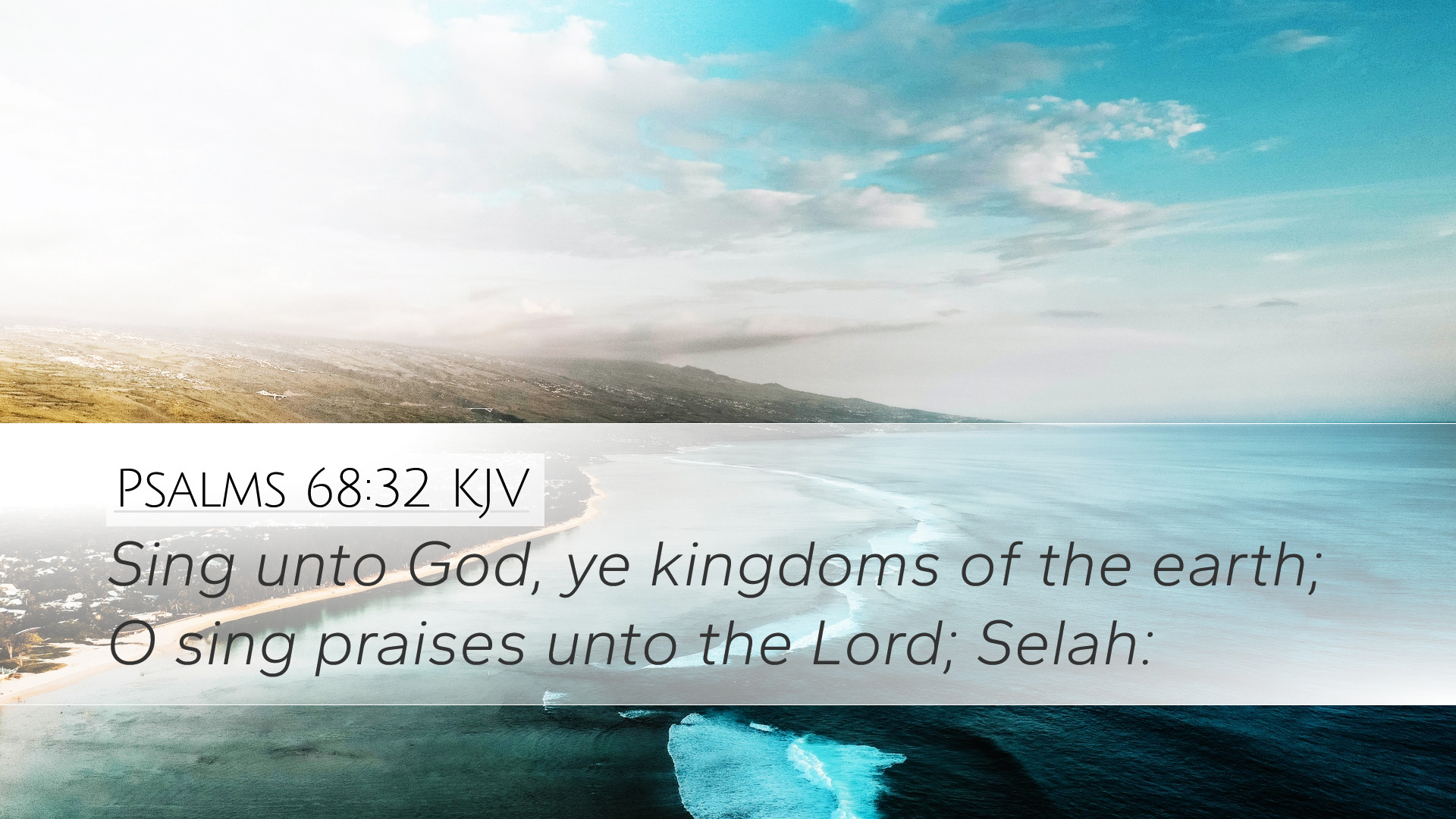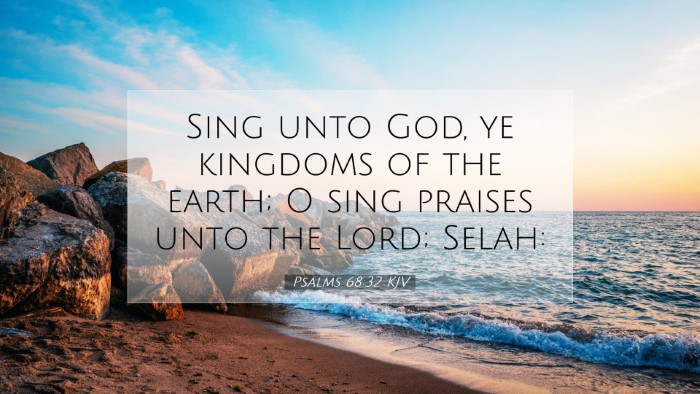Psalms 68:32 Commentary
Verse: "Sing unto God, ye kingdoms of the earth; O sing praises unto the Lord; Selah."
Overview
This verse from Psalm 68 is a call to nations and kingdoms to join in worship and praise to God. It emphasizes the universal nature of God's reign and invites the earth's inhabitants to acknowledge His sovereignty and goodness. The psalmist, in his poetic expression, highlights a fundamental truth of the faith — the call to worship is not limited to Israel alone but extends to all nations.
Insights from Matthew Henry
Matthew Henry, in his exposition of the Psalms, notes that this verse can be viewed as a summons to all kingdoms of the earth to recognize and proclaim the glory of God. He emphasizes the importance of unity in worship, suggesting that there is strength when multiple voices unite in praising the Lord. Henry observes that this call to sing praises is not merely a suggestion but an obligation for nations as they recognize God’s authority over their affairs.
- Universal Call: Henry highlights that the invitation extends beyond Israel, encompassing all kingdoms, indicating a universal recognition of God’s sovereignty.
- Praise as Response: The act of singing praises is seen as a natural response to God’s mighty acts and His majesty revealed in creation.
- Joyful Obligation: While it is a responsibility, Henry frames worship as a joyous encounter, encouraging believers to approach their duty with enthusiasm.
Insights from Albert Barnes
Albert Barnes offers a deep theological reflection on the verse, emphasizing the significance of song in praising God. In his commentary, he notes that song has been a long-standing form of worship in the church and serves multiple purposes, including expressing reverence, joy, and gratitude.
- Communal Worship: Barnes asserts that the collective aspect of singing is important, as it signifies the unity of purpose among believers.
- Diversity in Praise: He emphasizes that a variety of voices from different cultures and backgrounds enhances the richness of worship, reflecting the inclusiveness of God's kingdom.
- Historical Context: Barnes provides historical insight, suggesting that this call to worship may have been inspired by past victories of Israel, thus reinforcing the idea of God’s power and presence throughout history.
Insights from Adam Clarke
Adam Clarke’s commentary offers a contextual analysis that adds depth to the understanding of this verse. Clarke remarks on the poetic and musical structure of the Psalm and its significance in ancient worship settings. He notes that the term “sing” reflects both a literal and metaphorical call to action for the nations.
- Liturgical Importance: Clarke underscores the role of music and singing in the worship life of the people of God, which he sees as crucial for both individual and corporate expression of faith.
- Divine Praise: He elaborates on the concept that praising God is an acknowledgment of His rightful place in the hearts of humanity, encouraging believers to adopt an attitude of praise in all circumstances.
- Call to Action: Clarke treats the Selah as a prompt to pause and reflect on the weight of the message, encouraging worshippers to internalize the call to honor God.
Theological Implications
The theological significance of Psalms 68:32 extends beyond mere instruction to sing. It encapsulates the essence of who God is and how nations should respond to His nature. Addressing both Jewish and Gentile believers, the psalm stresses that all creation is called to recognize God's greatness.
- God's Sovereignty: This verse reflects the larger biblical theme of God's sovereignty over all nations, reminding readers that His reign is eternal and universal.
- Worship as Central to Faith: While worship is often seen as a personal or localized act, this psalm calls for a global response, reinforcing the idea that worship encompasses all of God’s creation.
- Hope for the Nations: The invitation to kingdoms suggests a future where all peoples will ultimately acknowledge God’s reign, a theme that resonates throughout both the Old and New Testaments.
Practical Applications
For pastors, students, and theologians, the verse encourages several practical applications:
- Encouraging Community Worship: Leaders can inspire congregations to embrace music and singing as central elements of worship, fostering unity among diverse groups.
- Global Outreach: This verse serves as a reminder of the call to witness to all nations, cultivating a vision for missions that includes music as a universal language.
- Spiritual Reflection: The idea of “Selah” invites individuals to take moments of pause in their busy lives to reflect on God’s goodness and to express gratitude through song.
Conclusion
Psalms 68:32 stands as a vital reminder of the global nature of God's call to worship. It encapsulates the joy and responsibility of extolling God’s greatness, not only as individuals but as an entire world. By emphasizing the unhindered nature of praise, the psalm enriches the understanding of worship as a communal and universal declaration of faith. In engaging with this text, we are invited to reflect on our roles as worshippers in a world that needs to hear the glorious song of redemption.


